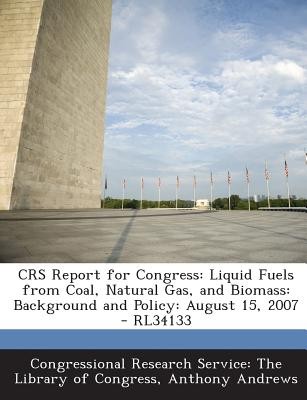
- We will send in 10–14 business days.
- Author: Anthony Andrews
- Publisher: Bibliogov
- ISBN-10: 1293245887
- ISBN-13: 9781293245880
- Format: 18.9 x 24.6 x 0.2 cm, minkšti viršeliai
- Language: English
- SAVE -10% with code: EXTRA
Reviews
Description
As the price of gasoline approaches the 1981 record high (adjusted for inflation), liquid transportation fuels synthesized from coal, natural gas, and biomass are proposed as one solution to reducing dependency on imported petroleum and strained refinery capacity. The technology to do so developed from processes that directly and indirectly convert coal into liquid fuel. Congress now faces decisions on whether, and to what extent, it should support such a solution. Lacking domestic petroleum resources, but abundant in coal, Germany built synthetic fuel plants during World War II that employed the Bergius coal hydrogenation process (direct liquefaction), and Fischer-Tropsch synthesis (indirect). The United States attempted to capitalize on the German experience after World War II. Despite considerable investment in synthetic fuel research and development, the United States cut support for commercialization when crude oil prices dropped and supplies stabilized in the mid-1980s. Since then, several synthetic fuels plants have been constructed around the world that convert coal, natural gas, or biomass to liquid fuels using the Fischer-Tropsch process. Several private ventures in the United States are now studying the feasibility of constructing Fischer-Tropsch synthetic fuel plants based on coal, natural gas, and biomass. Proposals to expand the use of coal ...
- Author: Anthony Andrews
- Publisher: Bibliogov
- ISBN-10: 1293245887
- ISBN-13: 9781293245880
- Format: 18.9 x 24.6 x 0.2 cm, minkšti viršeliai
- Language: English English
As the price of gasoline approaches the 1981 record high (adjusted for inflation), liquid transportation fuels synthesized from coal, natural gas, and biomass are proposed as one solution to reducing dependency on imported petroleum and strained refinery capacity. The technology to do so developed from processes that directly and indirectly convert coal into liquid fuel. Congress now faces decisions on whether, and to what extent, it should support such a solution. Lacking domestic petroleum resources, but abundant in coal, Germany built synthetic fuel plants during World War II that employed the Bergius coal hydrogenation process (direct liquefaction), and Fischer-Tropsch synthesis (indirect). The United States attempted to capitalize on the German experience after World War II. Despite considerable investment in synthetic fuel research and development, the United States cut support for commercialization when crude oil prices dropped and supplies stabilized in the mid-1980s. Since then, several synthetic fuels plants have been constructed around the world that convert coal, natural gas, or biomass to liquid fuels using the Fischer-Tropsch process. Several private ventures in the United States are now studying the feasibility of constructing Fischer-Tropsch synthetic fuel plants based on coal, natural gas, and biomass. Proposals to expand the use of coal ...


Reviews